_________________________________________________
Update From Pollitecon Publications
June 2023 ________________________________________________
Sign
up to receive Updates
Many new books and some articles and videos have been added to the
Pollitecon Free Ebooks Library and website.
The Historical Differences Between the Macedonians and the Bulgarians
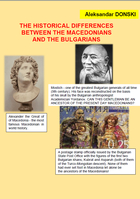 The
book The Historical Differences Between the Macedonians and the Bulgarians
by Aleksandar Donski is now available in English as a free ebook. Based
on Bulgarian and foreign sources, the book explains in easy-to-understand
terms why the Macedonians were never Bulgarians in history. It was published
by the Macedonian Literary Society "Grigor Prlichev" from Sydney in
cooperation with the Association of Macedonians from the Aegean part
of Macedonia "Mirka Ginova" from Shtip. The ebook has been sent individually
to all members of the European Parliament and other internationals.
Mr Donski has invited all Macedonians and friends of Macedonia to share
the ebook with national and international leaders and organizations.
The ebook is Here.
The
book The Historical Differences Between the Macedonians and the Bulgarians
by Aleksandar Donski is now available in English as a free ebook. Based
on Bulgarian and foreign sources, the book explains in easy-to-understand
terms why the Macedonians were never Bulgarians in history. It was published
by the Macedonian Literary Society "Grigor Prlichev" from Sydney in
cooperation with the Association of Macedonians from the Aegean part
of Macedonia "Mirka Ginova" from Shtip. The ebook has been sent individually
to all members of the European Parliament and other internationals.
Mr Donski has invited all Macedonians and friends of Macedonia to share
the ebook with national and international leaders and organizations.
The ebook is Here.
Bulgarian Conspiracy
 The
book Bulgarian Conspiracy was published in 1939 to expose what the author,
J Swire, said were the outrages and conspiracies perpetrated by the
Bulgarian government over Macedonia and other Balkan lands. Bulgarian
Conspiracy gives a truthful analysis of Bulgaria's history and policies
that boldly contradicts the official Bulgarian slant on history. Much
of that history involves its efforts to expand its territory, propagandize
the Macedonians and take over Macedonia. The book gives an invaluable
history to the current efforts by the Bulgarian government to claim
Macedonia and the Macedonians. Nearly 100 years ago, the author wrote
that "most Macedonians did not want to be Bulgarians". J Swire was a
journalist who was expelled from Bulgaria. The book is Here.
The
book Bulgarian Conspiracy was published in 1939 to expose what the author,
J Swire, said were the outrages and conspiracies perpetrated by the
Bulgarian government over Macedonia and other Balkan lands. Bulgarian
Conspiracy gives a truthful analysis of Bulgaria's history and policies
that boldly contradicts the official Bulgarian slant on history. Much
of that history involves its efforts to expand its territory, propagandize
the Macedonians and take over Macedonia. The book gives an invaluable
history to the current efforts by the Bulgarian government to claim
Macedonia and the Macedonians. Nearly 100 years ago, the author wrote
that "most Macedonians did not want to be Bulgarians". J Swire was a
journalist who was expelled from Bulgaria. The book is Here.
The Persecution of the Macedonians in Bulgaria
 The
book Tabu - A Time of Fear and Suffering - The Persecution of the Macedonians
in Bulgaria During Communism (1944 - 1989) is by academic and well known
human rights advocate, Stojko Stojkov. The author calls it a painful
and sadly belated book about the persecution by Bulgaria of its ethnic
Macedonians, who were tried, re-tried and sentenced without being heard
and without the right to a defence. Macedonians were national enemies,
traitors, apostates, and yet non-existent. And Bulgarian historians
did not want to hear about the memories and documents of the persecution
and assimilation of the Macedonian minority but instead did the opposite
and worked to prove there is no such minority. The author says it is
an inescapable truth that the ignorance of Bulgarian society about the
real situation of the Macedonian minority and nation and the delusion
of their non-existence are a contemporary crime of Bulgarian historiography
and journalism. The fate and the existence of the Macedonian minority
is a taboo subject. The book has many case studies and documents. It
is in Bulgarian, and is Here.
The
book Tabu - A Time of Fear and Suffering - The Persecution of the Macedonians
in Bulgaria During Communism (1944 - 1989) is by academic and well known
human rights advocate, Stojko Stojkov. The author calls it a painful
and sadly belated book about the persecution by Bulgaria of its ethnic
Macedonians, who were tried, re-tried and sentenced without being heard
and without the right to a defence. Macedonians were national enemies,
traitors, apostates, and yet non-existent. And Bulgarian historians
did not want to hear about the memories and documents of the persecution
and assimilation of the Macedonian minority but instead did the opposite
and worked to prove there is no such minority. The author says it is
an inescapable truth that the ignorance of Bulgarian society about the
real situation of the Macedonian minority and nation and the delusion
of their non-existence are a contemporary crime of Bulgarian historiography
and journalism. The fate and the existence of the Macedonian minority
is a taboo subject. The book has many case studies and documents. It
is in Bulgarian, and is Here.
The Macedonian Question in Communist Bulgaria
The Macedonian Question in Communist Bulgaria by Milena Borden is a
book chapter that looks at "the effects of the Macedonian question on
the formation, development and changes in the communist concept of Bulgarian
national identity". Among other topics it discusses the religious factor
in history, the Macedonian revolutionary organisations, the Balkan Wars,
Communist Politics during the Bulgarian Occupation (1941-44), The Failure
of Bulgaria's Macedonian Policy, The Macedonian Question during Communism
(1944-89), Macedonian censuses in Bulgaria, and the Macedonian-Bulgarian
language dispute. The author says that in the 1890s between 100,000
and 200,000 Macedonians emigrated to Bulgaria". That "The biggest concern
of communist Bulgaria was that if there was a Macedonian language there,
it would open the question of the language in Pirin Macedonia". And
that at the beginning of the WW2 occupation many people in Macedonia
met the Bulgarians as liberators but because of their assimilative policy
they were soon seen as conquerors and that "the occupation of Macedonia,
for which the Bulgarians so long dreamed, succeeded mainly in creating
hostility towards them." The chapter is Here.
Greek Atrocities Committed against the Macedonian People
 The
book Greek Atrocities Committed against the Macedonian People by Risto
Stefov is a collection of essays about some of the atrocities that were
committed against the Macedonian people by Greece. Mr Stefov says "This
series of articles will present evidence of atrocities perpetrated by
the Greek State against the innocent Macedonian civilian populations
prior to, during and after the Balkan wars. Most of the information
contained in the articles is obtained from the 1913 Carnegie Inquiry
and from Greek sources." The Carnegie Report was commissioned because
"Entire villages were burned down to the ground. Civilians were murdered
on mass. Old men, women and children were beaten, tortured and killed.
Women and young girls were indiscriminately and repeatedly raped. The
situation became so bad that the international community felt it necessary
to send a Commission to investigate." The book is Here.
The
book Greek Atrocities Committed against the Macedonian People by Risto
Stefov is a collection of essays about some of the atrocities that were
committed against the Macedonian people by Greece. Mr Stefov says "This
series of articles will present evidence of atrocities perpetrated by
the Greek State against the innocent Macedonian civilian populations
prior to, during and after the Balkan wars. Most of the information
contained in the articles is obtained from the 1913 Carnegie Inquiry
and from Greek sources." The Carnegie Report was commissioned because
"Entire villages were burned down to the ground. Civilians were murdered
on mass. Old men, women and children were beaten, tortured and killed.
Women and young girls were indiscriminately and repeatedly raped. The
situation became so bad that the international community felt it necessary
to send a Commission to investigate." The book is Here.
Music and ‘Re-education' in Greek Prison Camps
Music and ‘Re-education' in Greek Prison Camps: From Makronisos (1947–1955)
to Giaros (1967–1968) by Anna Papaeti is a paper that "examines the
policy of ‘re-education' for left-wing political prisoners in Greece
during the military Junta (1967–1974) at the prison camp on the island
of Giaros from 1967 to November 1968," says the author. She starts with
how folk culture was used to substantiate the Colonels' ideological
discourse and investigates how the music was used as a way to break
political prisoners in exile. "Music from loudspeakers was part of an
attempt to make detainees sign Declarations of Loyalty, renouncing their
values and their comrades," she says. "The ‘re-education' programme
of Giaros is examined here as a remainder of the Greek Civil-War legacy
(1946–1949), and particularly of the institutionalized ‘re-education'
and ‘rehabilitation' programme of the infamous prison camps on the island
of Makronisos (1947–1955)." The paper uses interviews with former detainees
to "underline the damaging effects of the use of music, highlighting
the need to understand music's capacity to degrade, but also torture,
individuals instead of uplift and ennoble the soul." The paper is Here.
Macedonia: Books, Genocide, Homeland, Villages
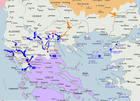 Macedonia:
Books, Genocide, Homeland, Villages is a talk given by Pollitecon publisher
Victor Bivell to the Canadian Macedonian Historical Society. The four
topics: Books, Genocide, Homeland and Villages refer to four Pollitecon
projects. Books is about the nearly 500 free ebooks that are now available
in the Pollitecon Free Ebooks Library. Genocide is about a new page
on the website that provides material on the Macedonian Genocide in
Greece. Homeland is about the need for more Macedonians to return to
Macedonia if Macedonians want to keep the land and country. Villages
is about the growing popularity of village websites and Facebook groups.
The talk is Here.
A video of the talk is Here.
Macedonia:
Books, Genocide, Homeland, Villages is a talk given by Pollitecon publisher
Victor Bivell to the Canadian Macedonian Historical Society. The four
topics: Books, Genocide, Homeland and Villages refer to four Pollitecon
projects. Books is about the nearly 500 free ebooks that are now available
in the Pollitecon Free Ebooks Library. Genocide is about a new page
on the website that provides material on the Macedonian Genocide in
Greece. Homeland is about the need for more Macedonians to return to
Macedonia if Macedonians want to keep the land and country. Villages
is about the growing popularity of village websites and Facebook groups.
The talk is Here.
A video of the talk is Here.
Ne si ja davame Makedonija
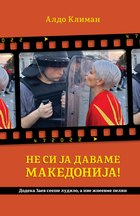 Ne
si ja davame Makedonija by Aldo Kliman is a collection of essays and
writings about the political madness of the Zaev period in Macedonia
and the changing of the Republic of Macedonia's name against the will
of the Macedonian people. The issues are looked at from many angles
including the roles of the EU and US as well the contradictions against
the current and historical aspirations of the Macedonian people and
freedom fighters. Mr Kliman is writer, poet, essayist, literary critic,
translator, journalist and publisher. The book is a collection of newspaper
columns, public appeals, personal reactions and selected posts from
January 2019 to February 2023. The book is in Macedonian, and is Here.
Ne
si ja davame Makedonija by Aldo Kliman is a collection of essays and
writings about the political madness of the Zaev period in Macedonia
and the changing of the Republic of Macedonia's name against the will
of the Macedonian people. The issues are looked at from many angles
including the roles of the EU and US as well the contradictions against
the current and historical aspirations of the Macedonian people and
freedom fighters. Mr Kliman is writer, poet, essayist, literary critic,
translator, journalist and publisher. The book is a collection of newspaper
columns, public appeals, personal reactions and selected posts from
January 2019 to February 2023. The book is in Macedonian, and is Here.
Health and Health Capital: The Case of Macedonians in Australia
 Health
and Health Capital: The Case of Macedonians in Australia by Irene Veljanova
is a carefully researched thesis with a wealth of original and historical
information about the Macedonians, both in Australia and the world.
Among many topics, the thesis looks at the relationship between identity
and health. The author says that while academic literature explores
the relations between overt ethnic violence and health, the relations
between symbolic ethno-violence and health appear to have been overlooked.
She says symbolic ethno-violence is covert violence directed at a people
where imposed meanings on them are exerted as legitimate by concealing
the power relations behind the force. This can seriously impact health
attitudes and practices amongst victim ethno-cultural communities. She
says "The symbolic ethno-violence perpetrated against Macedonians in
Australia, i.e., the non-recognition of their ethno and civic identity,
has the potential to affect community health attitudes" and health practices.
The author undertook focus group sessions in Sydney, Melbourne, Perth,
Port Kembla, and Queanbeyan plus an Australia-wide survey of ethno-Macedonians
and document analyses to arrive at her findings. The thesis is Here.
Health
and Health Capital: The Case of Macedonians in Australia by Irene Veljanova
is a carefully researched thesis with a wealth of original and historical
information about the Macedonians, both in Australia and the world.
Among many topics, the thesis looks at the relationship between identity
and health. The author says that while academic literature explores
the relations between overt ethnic violence and health, the relations
between symbolic ethno-violence and health appear to have been overlooked.
She says symbolic ethno-violence is covert violence directed at a people
where imposed meanings on them are exerted as legitimate by concealing
the power relations behind the force. This can seriously impact health
attitudes and practices amongst victim ethno-cultural communities. She
says "The symbolic ethno-violence perpetrated against Macedonians in
Australia, i.e., the non-recognition of their ethno and civic identity,
has the potential to affect community health attitudes" and health practices.
The author undertook focus group sessions in Sydney, Melbourne, Perth,
Port Kembla, and Queanbeyan plus an Australia-wide survey of ethno-Macedonians
and document analyses to arrive at her findings. The thesis is Here.
Lou Vlasho - An American Son of Macedonia
 Lou
Vlasho - An American Son of Macedonia is the biography of the successful
business leader, community and political activist and Honorary Macedonian
Consul to the US. Mr Vlasho's parents were from the village of Breznica
in the Lerinkso region of Aegean Macedonia. He was born in and spent
most of his working life in Ohio before moving to Florida. The book
is well documented with information on his extended family and village,
on his many business and professional activities over his long career,
and on his many community and political activities to assist Macedonia
and Macedonians in the diaspora and in the Republic of Macedonia. The
book is also well illustrated with many historical and beautiful photographs.
The book is Here.
Lou
Vlasho - An American Son of Macedonia is the biography of the successful
business leader, community and political activist and Honorary Macedonian
Consul to the US. Mr Vlasho's parents were from the village of Breznica
in the Lerinkso region of Aegean Macedonia. He was born in and spent
most of his working life in Ohio before moving to Florida. The book
is well documented with information on his extended family and village,
on his many business and professional activities over his long career,
and on his many community and political activities to assist Macedonia
and Macedonians in the diaspora and in the Republic of Macedonia. The
book is also well illustrated with many historical and beautiful photographs.
The book is Here.
Velika - A Biography
 Velika
by Jagoda Zdraveska-Koteska is the biography of the author's mother,
Velika Zdraveska nee Zlatanoska. It starts with a detailed account of
her early childhood and youth in the village of Dobrushevo in the Bitola
region of Macedonia, and includes a brief history of the village and
its families, traditions, celebrations, beliefs, food, medicines, costumes
and more. It details the life and customs of her family and the villages
of the Pelagonia region of Macedonia. The there is a good account of
how Velika's marriage was arranged. Velika's personal story goes from
her village to her husband's village of Lopatitsa, widowhood after only
five years of marriage, and then to Melbourne, Prilep and back to Melbourne.
The author says her mother is an admirable spirit with endurance, cheerfulness,
strong will, and the courage to look life straight in the eyes. The
book is in Macedonian, and is Here.
Velika
by Jagoda Zdraveska-Koteska is the biography of the author's mother,
Velika Zdraveska nee Zlatanoska. It starts with a detailed account of
her early childhood and youth in the village of Dobrushevo in the Bitola
region of Macedonia, and includes a brief history of the village and
its families, traditions, celebrations, beliefs, food, medicines, costumes
and more. It details the life and customs of her family and the villages
of the Pelagonia region of Macedonia. The there is a good account of
how Velika's marriage was arranged. Velika's personal story goes from
her village to her husband's village of Lopatitsa, widowhood after only
five years of marriage, and then to Melbourne, Prilep and back to Melbourne.
The author says her mother is an admirable spirit with endurance, cheerfulness,
strong will, and the courage to look life straight in the eyes. The
book is in Macedonian, and is Here.
On the Reports of the Russian and Austrian Consuls in Bitola During
Ilinden
With Love Towards the Truth by George Lazarevski is a paper that presents
numerous reports of the Russian and Austrian consuls in Bitola about
the state of these areas before and after the Ilinden Uprising. The
author says that the period was filled with stormy events that were
the subject of observation by foreign consuls. While the consuls in
Bitola received official reports from the valia in Bitola, these did
not show the real situation of the events that took place. The Russian
and Austrian consuls in their reports to their superiors presented the
real situation and developments in Macedonia, and they often presented
to the Bitola valia to protect the peaceful population. Their love for
the truth was great, says Mr Lazarovski, and the Russian consul Rostkovsky
paid for that love of truth with his life. The paper is Here.
The Macedonian version is Here.
My Family's Stories
My Family's Stories by Hellen Bakarnis has been added to the Life in
Aegean Macedonia section of the Pollitecon website. The article is about
some of the key events in the lives of the writer's grandparents and
parents. Among these, it talks about the family's experiences under
the Metaxis government, during the Greek Civil War, and their migration
to Australia and their new lives. It discusses how members of her family
helped the partizans and were never allowed back into Greece to visit
their family, the experiences of some of the men who traveled overseas
to make money, how the women lived and raised their children, and how
her parents built a life in Australia and contributed to the Macedonian
community. The article is Here.
The Battle of Pelion 335 BC
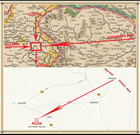 A
new brochure by Kiril Arsov is about The Battle of Pelion 335 BC. This
was fought by Alexander the Great against Clytus, the son of Bardylis,
who had revolted against him and seized the city of Pelion. The author
says Pelion was an important western Macedonian border fortress that
existed on a hill at the foot of Jablanica mountain on the western side
of the Ohrid-Struga valley. The brochure contains interesting historical
information about the area and many beautiful photographs. The brochure
is Here.
A
new brochure by Kiril Arsov is about The Battle of Pelion 335 BC. This
was fought by Alexander the Great against Clytus, the son of Bardylis,
who had revolted against him and seized the city of Pelion. The author
says Pelion was an important western Macedonian border fortress that
existed on a hill at the foot of Jablanica mountain on the western side
of the Ohrid-Struga valley. The brochure contains interesting historical
information about the area and many beautiful photographs. The brochure
is Here.
House on the Lake
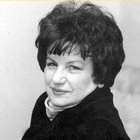 House
on the Lake/ Kukja na Ezero is a novel by Dragica Najcheska that explores
what can go wrong when the main character, Violeta Nikolovska, buys
a small and abandoned house on the shore of Lake Ohrid. The reviewer,
Dr. Georgi Stalev, says "Immediately after buying it, with her first
attempts to prepare it for living and vacationing, things in her life
become extremely complicated. Even in her wildest fantasy, Violeta couldn't
have imagined the trauma and painful moments she would go through and
how long they would last in the following years, until she finally lived
in it." The novel explores selfishness, greed, bribery and bureaucratic
corruption, and success through good people. The novel was translated
into English by Risto Stefov. The English version is Here.
The Macedonian version is Here.
House
on the Lake/ Kukja na Ezero is a novel by Dragica Najcheska that explores
what can go wrong when the main character, Violeta Nikolovska, buys
a small and abandoned house on the shore of Lake Ohrid. The reviewer,
Dr. Georgi Stalev, says "Immediately after buying it, with her first
attempts to prepare it for living and vacationing, things in her life
become extremely complicated. Even in her wildest fantasy, Violeta couldn't
have imagined the trauma and painful moments she would go through and
how long they would last in the following years, until she finally lived
in it." The novel explores selfishness, greed, bribery and bureaucratic
corruption, and success through good people. The novel was translated
into English by Risto Stefov. The English version is Here.
The Macedonian version is Here.
More Free Ebooks
There are now 480 free ebooks in The
Pollitecon Free Ebooks Library.
Macedonia Needs Macedonians

Please remember that Macedonia Needs Macedonians. The Facebook page
for the Macedonia Needs Macedonians group is Here.
Two major tourism portals are Travel2Macedonia which is Here,
and Macedonia - Timeless which is Here.
Canadian Macedonian Books
 A
reminder that Canadian Macedonian Books has a great selection of Macedonian
books in English from around the world. These include non-fiction, fiction,
children's and cook books. Canadian Macedonian Books is run by Virginia
Evans, a former co-president of the Canadian Macedonian Historical Society
and founder of the Macedonian Film Festival in Toronto. Canadian Macedonian
Books is Here.
A
reminder that Canadian Macedonian Books has a great selection of Macedonian
books in English from around the world. These include non-fiction, fiction,
children's and cook books. Canadian Macedonian Books is run by Virginia
Evans, a former co-president of the Canadian Macedonian Historical Society
and founder of the Macedonian Film Festival in Toronto. Canadian Macedonian
Books is Here.
Sign
up to receive Pollitecon Updates
Thank you
Victor Bivell
Pollitecon Publications
PO Box 3411
Wareemba NSW 2046 Australia
Ph 02 9705 0578
Email vbivell @ pollitecon.com
Web http://www.pollitecon.com
More Updates

